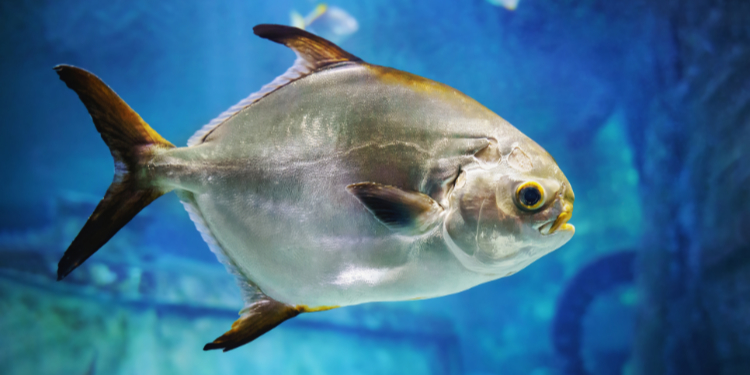JWAS Editor's Choice Awards 56(1)
The use of integrated multi-trophic aquaculture (IMTA) for multi-species culture is not new, but thi...

Similar to other aquaculture species, Florida pompano, Trachinotus carolinus, can be reared on diets that utilize soy-based protein; however, carbohydrates and other anti-nutritional factors can affect digestibility. This study investigated the use of dietary carbohydrase enzymes to improve carbohydrate digestibility for Florida pompano. The authors utilized the carbohydrase enzyme complex (Natugrain® TS L, BASF Corporation, Ludwigshafen, Germany), which consisted of endo-1,4-ß-xylanase and endo-1,4-ß-glucanase and was designated Xyl + Glu, in juvenile pompano diets and determined the effects on growth performance, feed utilization, and digestibility. A growth trial was conducted in a recirculating system using four iso-nitrogenous (40%) and iso-lipidic (8%) test diets consisting of 0, 0.015, 0.030, and 0.045% of Xyl + Glu. No significant differences (p > 0.05) in growth and feed conversion were observed; however, there were significant differences in the thermal growth coefficient (TGC) between the 0.015 and 0.030% diets. All the diets containing the enzymatic treatments showed significant differences in apparent digestibility for crude protein compared to the basal diet. Based on the digestible protein improvements, the authors calculated a 3.37% improvement in available protein for Florida pompano when fed this enzyme complex. They suggest that further research is needed that evaluates different types of exogenous enzymes to improve plant-based diets for Florida pompano.
Probiotic use in aquaculture has increased and is viewed as a potential means of improving health and reducing the need for antibiotic treatments. The authors of this study investigated the effects of feeding Bacillus cereus YB1 to juvenile black rockfish (Sebastes schlegelii). They compared growth, intestinal digestive enzyme activity, liver antioxidant enzyme activity, and intestinal tissue structures following feeding of four diets: a control group with no YB1 supplement in the diet and three treatment groups E-L, E-M, and E-H containing 105, 106, and 107 CFU/g B. cereus YB1, respectively. Results from this study showed a significant increase in weight gain and specific growth rate and a reduction in feed conversion rate in fish fed the three diet treatment groups. Along with the observed growth enhancement in black rockfish following feeding of B. cereus YB1 strain, antioxidant enzyme activity in the liver and histological gut structure was enhanced. The authors therefore suggest that including B. cereus YB1 as a diet supplement during black rockfish farming could provide eco-friendly benefits associated with enhanced growth and health.